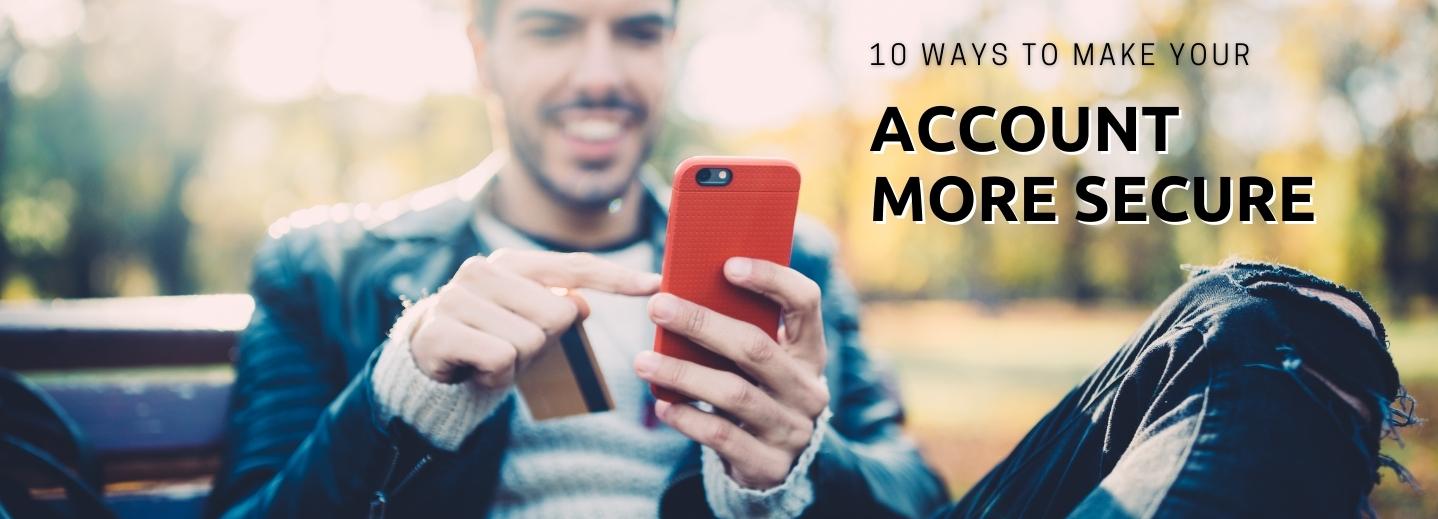10 Ways to Make Your Account More Secure

In today’s digital world, it is more important than ever for people to be vigilant in protecting their identity. Identity theft and fraud are on the rise, and scammers are becoming smarter and more creative with how they’re targeting people and their accounts. Figuring out where to begin to protect yourself can be overwhelming. Here are ten things you can start doing right now to help keep your accounts more secure
1. Change Your Online Banking Password Regularly
Remember to change and update your online banking passwords regularly. You should try and change them every three to six months to help lower the chances of your password being decoded or stolen by hackers.
2. Close Old Accounts
If you have old financial accounts from years past that you no longer use, they may be vulnerable to being hacked. Additionally, they make an excellent opening for hackers to access the more valuable accounts that you do use regularly. Therefore, it makes sense to close the old accounts you’re not using and keep your number of accounts down to a minimum.
3. Use a Strong Password
Be sure your password is complex and strong. Your passwords should include 8 to 12 characters, symbols, numbers, and upper & lowercase letters. Whenever possible, use a multi-factor ID for added protection.
4. Never Share Your ATM or Debit Card PIN
Never give your PINs, passwords, or personal information out to anyone, especially not over the Internet. This includes things like:
- Social security numbers
- Bank account information
- Passwords
- Credit card numbers
- Debit card PIN
If you’re interacting with a business or financial institution, make sure any private or financial information you submit online is secure. You can tell if the webpage you’re visiting is secure by the HTTPS:// in the web address. Additionally, never send your account information to a financial institution using a social media platform.
5. Keep Your Mobile Device Locked
Require a passcode, fingerprint lock, Face ID, or PIN to open your mobile phone or device. Also, consider which personal information you allow apps to use. For instance, not all apps need access to your location or your pictures. Go through each app and decipher what access is most appropriate for each.
6. Log Out When Finished with Online or Mobile Banking or Other Apps
It might make sense to you to stay logged into your favorite services or apps, so you won’t have to enter your password each time you want to check your account. The problem is that unlocked apps make it simpler for anyone picking up your device to access your accounts.
While most financial institutions will log you out automatically after a period of inactivity, it’s safer to log out manually and know your session is closed.
7. Don’t Log in to Online or Mobile Banking Using Public Wi-Fi
Use public Wi-Fi with extreme caution. When using Wi-Fi, be sure you trust the host. Hackers are notorious for parking in public places and tapping into Wi-Fi networks to gain access to people’s information. If your employer requires you to travel and doesn’t furnish you with a Virtual Private Network (VPN), you should consider subscribing to your own reputable VPN provider. Also, make sure your home’s Wi-Fi is password protected.
8. Use Firewalls and Antivirus Software on Your Devices
There are numerous antivirus and malware programs available online. Some you can set up for free, and others might require a paid subscription. Most subscriptions allow you to protect all your devices, not simply your computer as in years past. Firewalls are also crucial to the security of each of your devices.
9. Use a Two-Factor Authentication
Two-factor authentication is vital for securing your financial information. After you log into your credit union’s online or mobile banking, you’ll receive a code via email or text. The code and password confirm you’re the only one who’s accessing your account.
Two-factor authentication is more secure than security questions. It can be easy for security questions to be found on the internet. For instance, your first best friend or mother’s maiden name could easily be found if you’ve posted about either of them at any point on social media.
10. Turn Alerts On
Always be “in the know” of what’s going on with your accounts. Sign up for both text and in-app alerts to be notified about all activity on your accounts.
CAMPUS Can Help!
It’s crucial you keep your financial and other accounts secure. While, as your credit union, we invest in the best security for your accounts, these tips will help protect you even more.
If you have questions on the security of your accounts or believe you may have been a victim of fraud, please stop by any of our convenient service center locations or call 800-367-6440. We’re always here to help.
More Resources:
Check out our previously-recorded Identity Theft and Fraud Webinar.
Learn more about online fraud, passwords, and fraud protection on our security page.
By CAMPUS USA